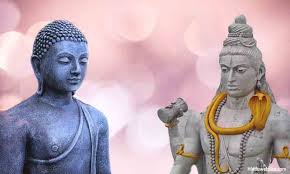In the vast tapestry of spiritual exploration, Hinduism and Buddhism stand as intertwined threads, each weaving a narrative of ancient wisdom and profound insight. From the fertile soils of the Indian subcontinent, these two traditions have flourished, their roots entwined in a shared quest for understanding the mysteries of existence.
At the heart of both Hinduism and Buddhism lies a deep reverence for the cosmic order, a recognition of the interconnectedness of all beings and phenomena. Through the cycles of karma and rebirth, seekers traverse the landscapes of consciousness, guided by the eternal dance of dharma.
Meditative practices form the warp and weft of these spiritual traditions, offering pathways to inner peace, clarity, and enlightenment. In the quietude of meditation, practitioners journey inward, transcending the boundaries of self to touch upon the boundless expanse of universal consciousness.
Nonviolence and compassion flow like rivers of light through the tapestry of Hindu and Buddhist ethics, illuminating the path towards harmony and understanding. In temples adorned with sacred symbols, devotees offer prayers and rituals, seeking communion with the divine.
As we unravel the threads of these ancient traditions, we discover not only the richness of their individual tapestries but also the intricate patterns they create when woven together. In the shared journey of Hinduism and Buddhism, we find a tapestry of unity, woven from the threads of timeless wisdom and universal truth.
Hinduism and Buddhism share several similarities, as they both originated in the Indian subcontinent and have influenced each other over millennia. Here are some key similarities between the two:
Concept of Dharma: Both Hinduism and Buddhism emphasize the importance of living in accordance with one’s dharma or duty. While the specifics of dharma may vary between the two traditions, the underlying principle of ethical conduct and fulfilling one’s responsibilities remains consistent.
Belief in Karma: Both traditions share the belief in karma, the law of cause and effect. According to this concept, one’s actions (karma) have consequences, which can affect future experiences and incarnations.
Reincarnation (Samsara): Hinduism and Buddhism both accept the idea of samsara, the cycle of birth, death, and rebirth. Individuals are believed to undergo multiple lifetimes, influenced by their karma, until they achieve liberation (moksha in Hinduism, nirvana in Buddhism).
Meditative Practices: Both traditions place a strong emphasis on meditation as a means of achieving spiritual growth, inner peace, and enlightenment. Various forms of meditation, including mindfulness and concentration practices, are integral to both Hindu and Buddhist paths.
Nonviolence and Compassion: Both Hinduism and Buddhism advocate for nonviolence (ahimsa) and compassion towards all living beings. This principle is reflected in their ethical teachings and emphasizes the importance of kindness, empathy, and non-harming.
Cosmic Order and Unity: Hinduism and Buddhism share a view of the universe as an interconnected and harmonious whole. While Hinduism may conceptualize this as Brahman (the ultimate reality) and Atman (the individual soul), Buddhism emphasizes the interconnectedness of all phenomena and the concept of emptiness (shunyata).
Iconography and Rituals: Despite some differences, both traditions employ rituals, ceremonies, and iconography as expressions of devotion and spiritual practice. Temples, statues, offerings, and prayers play significant roles in both Hindu and Buddhist worship.
Philosophical Influences: Hindu and Buddhist philosophies have historically influenced each other, with exchanges of ideas occurring throughout history. Concepts such as yoga, meditation techniques, and philosophical debates have been shared between the two traditions.
While Hinduism and Buddhism share these similarities, it’s important to recognize that they also have distinct theological, philosophical, and ritualistic differences. Each tradition has its own unique teachings, practices, and interpretations that distinguish it from the other.









